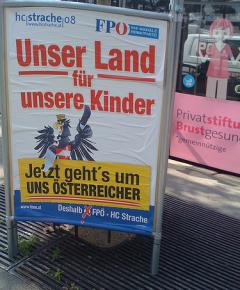Behind election gains for Austria’s neo-Nazis
argues that the policies of the mainstream parties and a declining economy opened the door for Austria's two pro-Nazi parties.
"THE WINNERS as losers." That's how the German newsmagazine Der Spiegel characterized the latest national elections in Austria.
Although the Social-Democratic Party of Austria (SPÖ, by its initials in German) took the largest share of the vote, at just under 30 percent, the real story was the huge gains made by Austria's two far-right parties.
The Freedom Party of Austria (FPÖ) increased its 2005 results by over 7 percentage points, winning a total of 18 percent of the vote. The Coalition for the Future of Austria (BZÖ), led by the Nazi sympathizer Jörg Haider, won a further 11 percent of the vote.
Taken together, the totals of both far-right parties amount to almost as much as the vote for the SPÖ. And the far right's combined result demoted to third place the mainstream conservative party, the Austrian People's Party (ÖVP), at just 25.6 percent of the vote. This election gave the two mainstream Austrian parties, the SPÖ and the ÖVP, their weakest results since 1945.
The results of the September 28 election will not be official until absentee results are announced October 6. But the meaning of these elections should be absolutely clear.

On the one hand, the gains made by the far-right parties represent a strong protest vote against the two mainstream parties, the SPÖ and ÖVP. The two parties have governed in what is known as a "grand coalition" since the last national elections in 2005. In addition to an economic slowdown in the country, many voters grew tired of the gridlock in the government over tax policies and Austria's relationship to the European Union (EU).
On the other hand, the gains made by the FPÖ and the BZÖ shouldn't' simply be explained away as a protest vote.
The FPÖ has been the main far-right party in Austria for over a decade. It was led by Jörg Haider until he led a split from the organization in 2005 and founded the BZÖ. Currently, the FPÖ is headed up by Heinz-Christian Strache. Even though he and Haider have parted political ways, this doesn't mean that Strache is any less dangerous.
In his youth, Strache participated in paramilitary "war games" in the forests of Carinthia, the same province where Haider first became premier in 1999. In addition, Strache had to admit his association when he was younger to the Wiking Youth, a neo-Nazi organization--modeled after the Hitler Youth--that was banned in 1994.
The FPÖ based its campaign on right-populist slogans. Tapping into voter disgruntlement over high taxes and a souring economy, the FPÖ raised slogans attacking globalization and the European Union as the cause of Austria's problems.
Most important to their strategy, however, was a virulent anti-immigrant platform. FPÖ placards were plastered across the country promising "Our country for our children!" and "This time, it's about us Austrians!"
As this article was being written, it was unclear what government would be formed out of the elections, as no party won a clear majority. Most analysts believe the 10 percent of the vote represented by absentee ballots, which will be announced October 6, won't make a substantial difference in the proportion of the vote thus far.
Before the elections, the ruling SPÖ and the ÖVP had broken off their coalition and vowed not to work together again. And voters were clearly fed up with the previous two years of their coalition government.
Nevertheless, the former SPÖ chancellor, Alfred Gusenbauer, made a call on October 5 for the two parties to form a new government as "the most rational thing for our country." Such a revived coalition can't be ruled out, since the split between the egomaniacal figures of the FPÖ and the BZÖ calls into question the likelihood of the two rival far-right parties joining together in any government.
In any case, this election has made it clear that there is a dire need for a political alternative to the left of the SPÖ. Although the far right made frightening gains in this election, it would be wrong to conclude that the majority of Austrians are in the thrall of the far right. Instead, voters fed up with politics as usual simply did not have many alternatives.
The Green Party did win some 10 percent of the vote. And a coalition of far-left groups stood candidates in five provinces. But without a real base, those candidacies were inconsequential. The Communist Party of Austria (KPÖ) stood candidates, but has long been discredited as a viable left-wing alternative.
Despite this weak showing, there is an opening to build a left-wing alternative to mainstream politics in the country. The need for such an alternative has never been greater--to ensure that working-class anger isn't exploited by the right to scapegoat immigrants or implement reactionary nationalist answers to corporate globalization.


